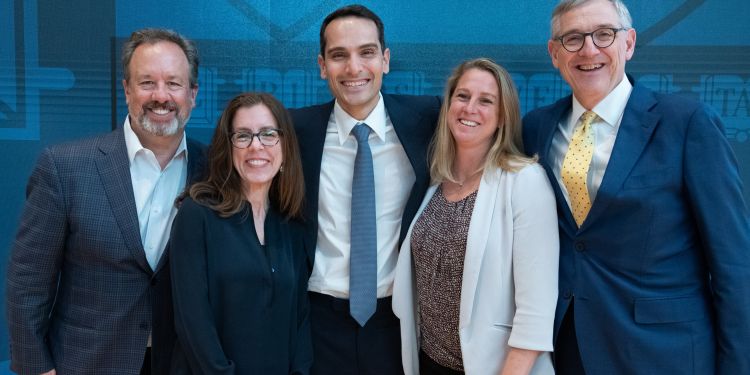This is a repost from HBS Newsroom, see the original post here.
“Climate change, and the energy and materials transition, is one of the most complicated and challenging business, geopolitical, and social issues of our century. At the same time, it is an incredible opportunity for businesses to develop solutions—scalable and profitable business models and services bettering the lives of people,” said Professor George Serafeim at the opening of the Accelerating Climate Solutions alumni conference at the Harvard Business School (HBS) on May 10, 2023.
As part of Harvard Climate Action Week, with 14 events demonstrating the climate research, education, and engagement across Harvard University, centered around the Salata Institute for Climate and Sustainability, the alumni conference convened HBS faculty, alumni, and other business leaders, investors, and entrepreneurs for a day of discussions about what it takes to discover, develop, scale, and achieve meaningful progress on climate solutions.
In his welcome address, Dean Srikant Datar harkened back to the 2010 founding of the School's Business and Environment Initiative (BEI).
“You will see, throughout the day, the way the seeds we planted at that time have taken roots, sprouted, and matured,” said Datar. “Today’s session topics are areas we've been researching, writing cases about, and teaching and developing in the curriculum for many years.”
The conference featured six plenary sessions in the morning and afternoon, a networking lunch followed by smaller breakout case discussions, and an evening networking reception.
The morning plenaries focused on reimagining the solutions infrastructure, with Serafeim, Professor Peter Tufano, and senior lecturer Eleanor Laurans moderating discussions on the central nature of climate to business, the money and skills necessary to fund a decarbonized future, and different approaches to building a just and skilled workforce.
Tufano’s session on financing highlighted the growing sense of urgency in finding sufficient funding. Scott Jacobs (MBA 2007), CEO and cofounder of Generate Capital, drew applause for challenging the notion that digital apps, instead of skilled people, could solve climate problems.
“We don’t need more digital solutions to save the world, we need more physical solutions. We need great entrepreneurs who are willing to take the risk and who are trustworthy to a capital provider to do what they said they were going to do and deliver the economic value that the projects promise,” said Jacobs. “The only way you can deliver that value, whether it’s to the investor or to other stakeholders like the community and the other parts of the value chain, is if we have the best people doing it. It’s all still a matter of human capital. We don’t have the human capital, or the scale of human capital, to mobilize $2.4 trillion or more through 2030 and more thereafter. That is why I am so excited to be at a place like HBS, because this is where we start solving that problem.”
During the plant-based lunch, guests divided into topic-based rooms to discuss issues they had voted on earlier in the morning: energy technologies, electricity, grid, and storage; finance and insurance; food and agribusiness; real estate, buildings, and infrastructure; and waste and circular economy.
The breakout sessions following lunch featured smaller case studies and topical discussions: measuring and reducing climate emissions with Professor Robert Kaplan and Assistant Professor Shirley Lu; battery producer Northvolt with Professor Debora Spar; the Iberdrola and the electricity sector with Professor Juan Alcacer; the capital stack with BEI director and conference co-chair Lynn Schenk and executive fellow Spencer Glendon; and leadership and climate action in cities with Professor Rosabeth Moss Kanter.
“The sessions provided an excellent opportunity for participants to dive deep into a topic via the HBS case method and open discussion approach, to engage with faculty and other experts in the room on specific, far-reaching topics, and to learn by example of businesses making change and using different approaches to addressing climate problems,” said Schenk. “They also raised awareness of a range of HBS faculty working on climate.”
Afternoon plenary sessions took on scaling accountability and impact. Serafeim, Tufano, and senior lecturer Jim Matheson moderated discussions on how board governance can and cannot drive climate performance; the importance of collaborative climate alliances; and the founders, entrepreneurs, and innovators disrupting the climate space.
The conference transitioned to its final panel with the upbeat and inspiring reminder that HBS students and the younger generations are driving change, by showing a video produced for the conference featuring four graduating students working on climate in a different ways.
In the final session with Matheson, three panelists presented mini-TED talks on their ventures:
Danielle Colson (MBA 2022), founder and COO of Mantel, described their breakthrough, highly efficient carbon-catching materials aimed at reducing industrial emissions; Rick Needham (MBA 2002), chief commercial officer of Commonwealth Fusion Systems, talked about his company’s work to design and build fusion machines to provide limitless, clean, fusion energy and the once-in a lifetime chance to help drive something potentially game-changing; and Carmichael Roberts, partner at Breakthrough Energy Ventures, discussed the firm’s mission of aggregating and funding ideas and companies to scale climate solutions.
In closing, Tufano urged attendees to discard the pervasive notion that nothing can be done to solve these problems, and to instead be motivated to take collective action.
“Thinking about the problems we face; it is a huge risk to the planet and a huge risk to all of us. The action has to be how we mitigate that risk and remove that risk. In doing that, we have to take on some of the risk. Whether as an entrepreneur, policymaker, in the collaboration space, or as a school—how do we take on risk to bear this risk for the planet? How do we do that?” asked Tufano. “We are not facing this alone. So bear the risk for the planet and enjoy and savor the experience that there's a real problem we have to solve, that perhaps we can solve it together.”

